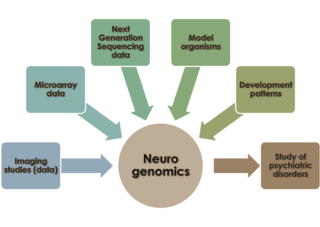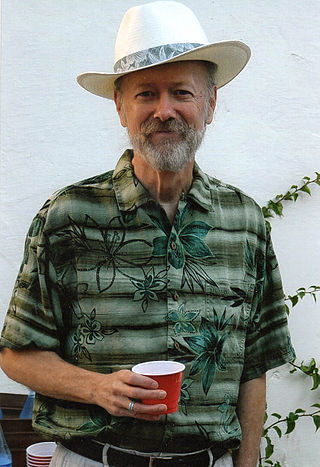Related Research Articles

Apolipoprotein E (Apo-E) is a protein involved in the metabolism of fats in the body of mammals. A subtype is implicated in the Alzheimer's disease and cardiovascular diseases. It is encoded in humans by the gene APOE.

In neuroscience, the default mode network (DMN), also known as the default network, default state network, or anatomically the medial frontoparietal network (M-FPN), is a large-scale brain network primarily composed of the dorsal medial prefrontal cortex, posterior cingulate cortex, precuneus and angular gyrus. It is best known for being active when a person is not focused on the outside world and the brain is at wakeful rest, such as during daydreaming and mind-wandering. It can also be active during detailed thoughts related to external task performance. Other times that the DMN is active include when the individual is thinking about others, thinking about themselves, remembering the past, and planning for the future.

Neurogenomics is the study of how the genome of an organism influences the development and function of its nervous system. This field intends to unite functional genomics and neurobiology in order to understand the nervous system as a whole from a genomic perspective.
Samuel E. Gandy, is a neurologist, cell biologist, Alzheimer's disease (AD) researcher and expert in the metabolism of the sticky substance called amyloid that clogs the brain in patients with Alzheimer's. His team discovered the first drugs that could lower the formation of amyloid.
The Semel Institute for Neuroscience and Human Behavior is a research institute of the University of California Los Angeles (UCLA). It includes a number of centers, including the "Center for Neurobehavioral Genetics", which uses DNA sequencing, gene expression studies, bioinformatics, and the genetic manipulation of model organisms to understand brain and behavioral phenotypes.
The Human Connectome Project (HCP) is a five-year project sponsored by sixteen components of the National Institutes of Health, split between two consortia of research institutions. The project was launched in July 2009 as the first of three Grand Challenges of the NIH's Blueprint for Neuroscience Research. On September 15, 2010, the NIH announced that it would award two grants: $30 million over five years to a consortium led by Washington University in St. Louis and the University of Minnesota, with strong contributions from University of Oxford (FMRIB) and $8.5 million over three years to a consortium led by Harvard University, Massachusetts General Hospital and the University of California Los Angeles.
Mark Steven Cohen is an American neuroscientist and early pioneer of functional brain imaging using magnetic resonance imaging. He currently is a Professor of Psychiatry, Neurology, Radiology, Psychology, Biomedical Physics and Biomedical Engineering at the Semel Institute for Neuroscience and Human Behavior and the Staglin Center for Cognitive Neuroscience. He is also a performing musician.
Cognitive genomics is the sub-field of genomics pertaining to cognitive function in which the genes and non-coding sequences of an organism's genome related to the health and activity of the brain are studied. By applying comparative genomics, the genomes of multiple species are compared in order to identify genetic and phenotypical differences between species. Observed phenotypical characteristics related to the neurological function include behavior, personality, neuroanatomy, and neuropathology. The theory behind cognitive genomics is based on elements of genetics, evolutionary biology, molecular biology, cognitive psychology, behavioral psychology, and neurophysiology.
Ashley Van Zeeland is an American neuroscientist, focusing on genomics, genetics, and biotechnology in the fields of autism and anorexia nervosa. Her work on autism revealed that genetic variants were linked to different communication pathways within the brain, and her work related anorexia nervosa to an enzyme regulating cholesterol metabolism.

Paul H. Patterson was a neuroscientist and the Anne P. and Benjamin F. Biaggini Professor of Biological Sciences at the California Institute of Technology.
Paul Thompson is a professor of neurology at the Imaging Genetics Center at the University of Southern California. Thompson obtained a bachelor's degree in Greek and Latin languages and mathematics from Oxford University. He also earned a master's degree in mathematics from Oxford and a PhD degree in neuroscience from University of California, Los Angeles.
Li-Huei Tsai is an American neuroscientist and the director of the Picower Institute for Learning and Memory in the Department of Brain and Cognitive Sciences at the Massachusetts Institute of Technology.
Catherine Lord is an American psychologist and researcher. She is widely recognized as one of the world's leading experts in autism. She currently serves as a member of the International Advisory Board for The Lancet Psychiatry, as co-chair of the Scientific Research Council of the Child Mind Institute, and as the George Tarjan Distinguished Professor of Psychiatry and Education at the Semel Institute for Neuroscience and Human Behavior at UCLA.
The OHBM Replication Award is an award presented annually by the Organization for Human Brain Mapping (OHBM). It is presented to a researcher in recognition of conducting and disseminating the results of a neuroimaging replication study of exceptional quality and impact.
Adriana Galván is an American psychologist and expert on adolescent brain development. She is a professor of psychology at the University of California, Los Angeles (UCLA) where she directs the Developmental Neuroscience laboratory. She was appointed the Jeffrey Wenzel Term Chair in Behavioral Neuroscience and the Dean of Undergraduate Education at UCLA.

BJ Casey is an American cognitive neuroscientist and expert on adolescent brain development and self control. She is the Christina L. Williams Professor of Neuroscience at Barnard College of Columbia University where she directs the Fundamentals of the Adolescent Brain (FAB) Lab and is an Affiliated Professor of the Justice Collaboratory at Yale Law School, Yale University.
Lucina Q. Uddin is an American cognitive neuroscientist who is a professor at the University of California, Los Angeles. Her research investigates the relationship between brain connectivity and cognition in typical and atypical development using network neuroscience approaches.
Alzheimer's disease (AD) in the Hispanic/Latino population is becoming a topic of interest in AD research as Hispanics and Latinos are disproportionately affected by Alzheimer's Disease and underrepresented in clinical research. AD is a neurodegenerative disease, characterized by the presence of amyloid-beta plaques and neurofibrillary tangles, that causes memory loss and cognitive decline in its patients. However, pathology and symptoms have been shown to manifest differently in Hispanic/Latinos, as different neuroinflammatory markers are expressed and cognitive decline is more pronounced. Additionally, there is a large genetic component of AD, with mutations in the amyloid precursor protein (APP), Apolipoprotein E APOE), presenilin 1 (PSEN1), bridging Integrator 1 (BIN1), SORL1, and Clusterin (CLU) genes increasing one's risk to develop the condition. However, research has shown these high-risk genes have a different effect on Hispanics and Latinos then they do in other racial and ethnic groups. Additionally, this population experiences higher rates of comorbidities, that increase their risk of developing AD. Hispanics and Latinos also face socioeconomic and cultural factors, such as low income and a language barrier, that affect their ability to engage in clinical trials and receive proper care.
Carrie Elyse Bearden is an American psychologist and academic. She is a professor at the David Geffen School of Medicine, University of California, Los Angeles, and Director of the UCLA Center for the Assessment and Prevention of Prodromal States, a clinical research program for youth at high risk for psychotic disorders. She is most known for her research taking a ‘genetics first’ approach to study brain mechanisms underlying the development of serious mental illness. Her work has identified biological convergence between genetically and clinically defined high-risk populations.
References
- ↑ "Past Officers of OHBM - Organization for Human Brain Mapping". humanbrainmapping.org. Retrieved 2019-09-08.
- ↑ "Dr. Susan Bookheimer receives lifetime achievement award in brain mapping | Semel Institute for Neuroscience and Human Behavior". semel.ucla.edu. Retrieved 2019-09-08.
- ↑ Bookheimer et al. 2000.